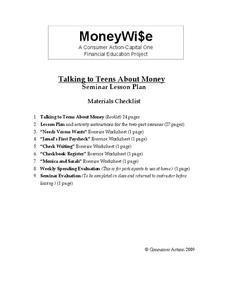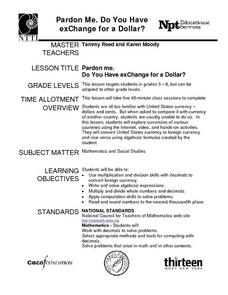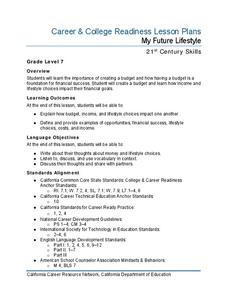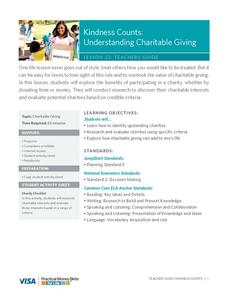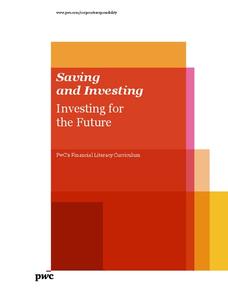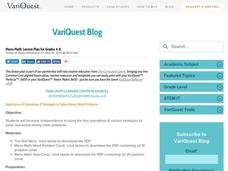Consumer Action
Talking to Teens About Money
Your teenagers are probably very good at spending money, but how good are they at managing it? Teach class members about banking, checking accounts, interest rates, car insurance, and many other relevant concepts with a series of...
Visa
Money Responsibility
Introduce young learners to the important life skill of responsibly managing money and recording how much they spend and save.
Curated OER
Close Observation: Coins
Integrate math, science, and speaking/listening with a collaborative hands-on activity. Each group works with a single penny, examining it with the naked eye and recording observations. Repeat using magnifying glasses. Then repeat with a...
Visa
Making it Work Together: Money and Roommates
Balancing money and first-time roommates can feel like a daunting prospect. Support your class members in understanding how financial agreements between roommates function, as well as the underlying importance of how to communicate about...
Visa
Savvy Spending: Sharpening Money Decisions
Do you really need that new laptop/phone/dress/jacket/etc.? Financial decisions require us to distinguish between our wants and our needs. Through discussion and the evaluation of scenarios on provided worksheets, this resource will...
Practical Money Skills
Protecting Your Money
How can you tell if a commercial or salesperson is being misleading? Encourage your learners to protect themselves and their money with a instructional activity about consumer rights. They review laws that keep consumers safe from faulty...
Federal Reserve Bank
Glo Goes Shopping
Making decisions can be very difficult. Show your class one way to evaluate choices with this instructional activity, which is inspired by the book Glo Goes Shopping. Learners practicing using a decision-making grid with the content of...
Federal Reserve Bank
Lesson 1: Katrina Strikes
Most families have an emergency kit in their home with flashlights, water, and extra food. But what happens to your money when disaster strikes? An economics lesson focused on the aftermath of Hurricane Katrina in 2005 demonstrates the...
Curated OER
Pardon Me. Do You Have Change For a Dollar?
Upper elementary and middle school learners explore currencies from a variety of countries. They use the Internet, video, and engage in hands-on activities. They practice converting U.S. currency to foreign currency and vice versa. This...
US Mint
Coin Connections
Help young mathematicians make cents out of the US currency system with this two-part math lesson plan. Children first learn the names and values for each type of coin, before learning to count and compare the values of coins using the...
Federal Reserve Bank
Banking on Debit Cards
What are the advantages and disadvantages of using a credit card versus a debit card? What are the costs of using a debit card irresponsibly? Here you'll find a lesson plan on key concepts that every learner should know regarding...
PricewaterhouseCoopers
Credit and Debt: Decisions, Decisions...
Borrowing money seems like a great idea until you are in over your head. High schoolers learn the benefits and risks associated with credit and how to be a responsible borrower. More than just credit cards, they learn trustworthiness is...
Visa
Dream Big: Money and Goals
Whether their objective is independent living, going to college, or buying a car, pupils will participate in discussions and complete worksheets to gain an understanding of how short- and long-term goals play a large role in helping...
Visa
Nothing But Net: Understanding Your Take Home Pay
Introduce your young adults to the important understanding that the money they receive from their paychecks is a net amount as a result of deductions from taxes. Other topics covered include federal, state, Medicare and social security...
Visa
Make It Happen: Saving for a Rainy Day
Every little penny counts, especially when it comes to saving for emergencies or long-term goals. Pupils evaluate different saving and investment strategies, such as a CD or money market account, through worksheets and by researching...
California Department of Education
My Future Lifestyle
Mortgage, insurance, car payments...how much money will your learners need to support their desired lifestyle? Part three in a six-part college and career readiness lesson plan series tasks young job seekers with creating a monthly...
Curated OER
Money Management Part I: Money and You: An Introduction to Money Management and Budgeting
Learners discuss personal finance and create personal budgets. They discuss the importance of managing their money and how money management skills impact their future. Note: This lesson is intended for use with a SMART Board and...
Visa
Kindness Counts: Understanding Charitable Giving
Financial literacy is generally focused on personal spending and saving, but consider an opportunity to talk to your pupils about how charitable giving can also factor into money management and how it can enhance life for both oneself...
PwC Financial Literacy
Saving and Investing: Investing for the Future
A fine lesson plan on saving and investing is here for you and your middle schoolers. In it, learners explore the values of time and money, and discover how small amounts of money invested over time can grow into a large "pot of gold."...
Illustrative Mathematics
Who Has the Best Job?
Making money is important to teenagers. It is up to your apprentices to determine how much two wage earners make with their after school jobs. Participants work with a table, an equation, and a graph and compare the two workers to see...
Virginia Department of Education
Practical Problems Involving Decimals
After discussing decimals and "going shopping" in the classroom, young mathematicians are given four practical word problems that require them to estimate their answers, given specific information. The highlight of the instructional...
Visa
The Influence of Advertising
Pupils become informed consumers and citizens with this lesson on the influence of advertising, identifying basic advertising techniques and discriminating between fact and claim in modern advertisements and commercials.
Curriculum Corner
Menu Math
Getting a meal, side dish, drink, and dessert can be delicious—but it can be expensive too! Practice addition and subtraction with money in a instructional activity that focuses on a sample menu, complete with task cards and word problems.
Mascil Project
Circular Pave-Stones Backyard
Pack the lesson into your plans. Young mathematicians learn about packing and optimization with the context of circular paving stones. They use coins to model the paving stones, and then apply knowledge of circles and polygons to...
Other popular searches
- Money Lessons Giving Change
- Counting Money Lessons
- Canadian Money Lessons
- Second Grade Money Lessons
- 2nd Grade Money Lessons
- Australian Money Lessons
- Shopping Money Lessons
- Math Money Lessons
- Money Lessons Elementary
- Fun Money Lessons
- Counting Money Math Lessons
- Adding Money Amounts Lessons


